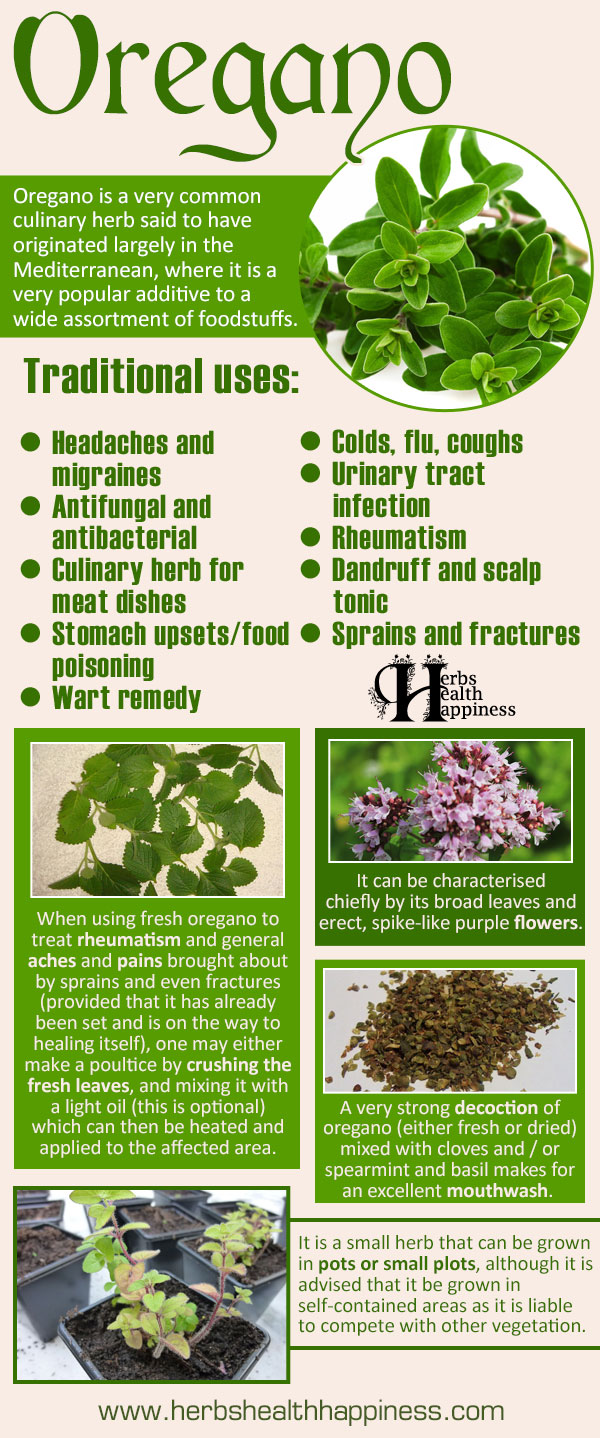Oregano

Oregano Uses and Benefits - image to repin / share
Infographic: herbshealthhappiness.com. Image credits: See foot of article

Botany And History
Oregano is a very common culinary herb said to have originated largely in the Mediterranean, where it is a very popular additive to a wide assortment of foodstuffs. Its use in some Asian and Eurasian areas may suggest that the plant's range is vast, although it's most common usage as a medicinal and culinary herb (at least in Western records) can be traced back to its supposed Mediterranean roots.
It is a small herb that can be grown in pots or small plots, although it is advised that it be grown in self-contained areas as it is liable to compete with other vegetation. Due to its myriad of varieties, it is impossible to denote a specific characteristic that encompassed all oregano cultivars, although it can be characterised chiefly by its broad leaves and erect, spike-like purple flowers. [1] Because it is more commonly employed as a culinary herb, rather than a medicinal one, it is only the leaves of the plant which are employed for both purposes, and while some folkloric beliefs attribute other medicinal uses for every constituent of oregano, no evidence of its use or practice can be found today.
Oregano - Culinary Uses
The most common uses for oregano is as a culinary herb. Because it is related to the mint family, it is used to impart a wonderful flavour to meats such as roasts and barbeques, although it is of a more pungent (in some varietals) taste than mint itself. Like mint, it is a perfect accompaniment to gamey meats, often used in tandem with other herbs and spices – a feature which is very common in Arabian, Egyptian, Turkish, and Syrian cuisine. [2] Perhaps the most well-known culinary use for oregano aside from its eponymous use as a pizza herb, is in its integration into a wide variety of spicy dishes, especially so in southern Italian cuisine. [3]
The leaves may also be incorporated into salads to add a little dash of flavour, and if dry (where the leaves are at their most flavourful), it can be used as a rub along with a coterie of 'hot' spices such as pepper and paprika, or as a general seasoning at the table in place of the more common salt. Dried or fresh thyme may also be added to soups and stews to impart a distinctly spicy-to-bitter taste that goes well with saline dishes and foodstuffs known for their somewhat 'heavy' flavour. It should be noted however that because oregano comes in a wide array of varietals, not all oregano taste alike, with some types of oregano more potent than others. While the general rule states that oregano is more powerfully aromatic when dry, some types of oregano do in fact possess a pungency that is surprising, even while it is still fresh.

Oregano (Oreganum vulgare)
Image source - Wikipedia - lic. under CC
Oregano - Herbal Uses
The medicinal uses of oregano go hand in hand with its culinary use, as any foodstuff that contains a significant amount of the herb will, no doubt, possess some of the therapeutic constituents gleaned from the herb. Most soup-based dishes that contain oregano are usually given to individuals who suffer from colds and from mild coughing, as well as from hoarseness of throat, as oregano was traditionally employed as a remedy for coughs and colds. Aside from its use as a cough and cold remedy, oregano, when made into a strong decoction, or a strong infusion (one decocts when using fresh leaves, and infuses when employing dry leaves) may even provide some relief for individuals suffering from rheumatism.
Because oregano possesses powerful anti-bacterial and anti-fungal properties, it not only preserves food that it is incorporated in from spoilage, but it also helps to fight fungal and bacterial infections when used medicinally, either taken internally as a tea, or used topically as a rinse. [4] Oregano is considered effective against food poisoning, and is regarded as one of natures most effective agents in this capacity. It may even be effective against nasties such as E. coli – however in such serious cases medical help should of course be sought.
A very strong decoction of oregano (either fresh or dried) mixed with cloves and / or spearmint and basil makes for an excellent mouthwash. [5]
Oregano is an age-old remedy for many urinary problems, and is prescribed as a remedy for urinary tract infection, as well as fungal and bacterial infections (i.e. Candida, jock-itch, etc.) not only when employed as a tea, but also when used as a rinse. [6] Aside from being a perfect all-natural intimate wash, a strong decoction or oregano may also be employed to alleviate dandruff and promote the darkening of hair when used as a hair-rinse, or otherwise macerated in an oil and applied to the hair and scalp regularly. This method not only promotes hair-growth, it also soothes the scalp and cools the head, helping to alleviate migraines and headaches. This macerated oil, when made with dried oregano (when macerating in oil, it is best to always employ dry herbs and spices) and an assortment of other known anti-histaminic herbs may be used as a topical liniment to help alleviate the symptoms of swelling brought about by rheumatism or arthritis, and even gout. [7]
When using fresh oregano to treat rheumatism and general aches and pains brought about by sprains and even fractures (provided that it has already been set and is on the way to healing itself), one may either make a poultice by crushing the fresh leaves, and mixing it with a light oil (this is optional) which can then be heated and applied to the affected area. In the event that an oily poultice is not desired, one may always just pound the leaves, place it on a bandage or some sterile gauze, and apply it unto the affected area. It should be noted however that heating a poultice makes it more effective. The juice which is extracted from this method may also be used by itself as a topical rub, with or without it being mixed with a carrier oil. It may even be used as a remedy to be rid of warts, or to help facilitate healing when applied to boils, pustules, and sores. [8]
Oregano also possesses an essential oil which can be extracted through distillation. This oil can also be used medicinally, usually as an anti-bacterial and anti-fungal remedy. It is typically applied topically by diluting it with a carrier oil (i. e. almond, coconut, sesame, jojoba), or otherwise ingested in very small amounts, usually mixed with water or some other type of beverage. [9] The oil of oregano may also be diffused via heat and employed for aromatherapy purposes to help alleviate headaches and colds (simply by making it into an inhalant by mixing a few drops of oil into boiling water and inhaling the ensuing fumes), or to promote an invigorating yet soothing sense of well-being when diffused as an air-freshener.
For those who are daring enough, dried oregano may even be used as a smokable herb, either by itself or mixed with other herbs. It is traditionally smoked as a treatment for asthma in some tribal cultures[10].
Oregano - Esoteric Uses
Oregano has been employed for magickal purposes, either burnt as an incense (when dry) to ward off troublesome entities and individuals, as well as to bring about luck, or solidify and strengthen a business pact. When employed as part of a "mojo" or medicine bag, it is said to help protect individuals not only from enemies, but from potential rivals in business as well. In traditional voodoo practices, it is even suggested as an herb that is said to give protection against authority forces, especially when mixed with another magickal herb – cascara sagrada[11].
Oregano - Safety Notes
Care should be taken when consuming oregano in excess though, as it may have some adverse side-effects when used in tandem with synthetic medicines. As a general rule, over-consumption of oregano (if not any form of consumption altogether) should be avoided by pregnant women as it may act as a mild, but nevertheless potentially risky abortifacient.
It is commonly advised that oregano should not be taken for extended periods, and internal use should be limited to a maximum of 3 weeks. One of the reasons for this is that oregano is reported to deplete levels of not only harmful bacteria in the stomach but also beneficial bacteria such as Lactobacillus plantarum. Thus, it is suggested to take probiotics after internal use of oregano. [12]
Oregano oil should not be taken in high doses as this would put the liver in danger of toxicity from thymol. Note however that in "true" "wild oregano" (Origanum valugare) the level of thymol is reported to be lower (around 2%) than in other species. Thus, it is important to buy from a reputable seller to be sure that you are getting true Origanum vulgare.
Names of Oregano, Past and Present
Greek: oreignanon (lit. 'mountain ornament')
French: origan Europeen / thé sauvage / thym des Bergers (other names exist)
German: dostenkraut
English: oregano / wintersweet / wild marjoram / mountain mint (other names exist, usually cultivars or varietals each with their place of origin. Other plants
not related to oregano are also called as such)
Latin (scientific nomenclature): Origanum vulgare
Latin (esoteric / mediaeval): origanum / origan
References:
[1-2] https://en.wikipedia.org/wiki/Oregano
[3-4] https://piebuko.blogspot.com/2009/01/benefits-of-oregano.html
[5-6] https://articles.timesofindia.indiatimes.com/2012-10-06/diet/29773695_1_oregano-health-benefits-menstrual-cramps
[7] https://www.herbwisdom.com/herb-oregano.html
[8] https://www.umm.edu/altmed/articles/rosemary-000271.htm
[9] https://www.homeremediesweb.com/oil_of_oregano_health_benefits.php
[10] www.blurtit.com/q467951.html
[11] https://herb-magic.com/oregano.html
[12] www.livestrong.com/article/136630/-the-dangers-oregano-oil/
Main article researched and created by Alexander Leonhardt,
© herbshealthhappiness.com
Infographic Image Sources:
https://commons.wikimedia.org/wiki/File:Origanum_vulgare_Prague_2011_3.jpg
https://en.wikipedia.org/wiki/File:Origanum_vulgare_young_plant_2.JPG
https://en.wikipedia.org/wiki/File:Oreganojf.JPG
https://en.wikipedia.org/wiki/File:Oregano-spice.jpg
(Creative Commons)


1. Famous Chef Sheds 60lbs Researching New Paleo Recipes: Get The Cookbook FREE Here
2. #1 muscle that eliminates joint and back pain, anxiety and looking fat
3. Drink THIS first thing in the morning (3 major benefits)
4. [PROOF] Reverse Diabetes with a "Pancreas Jumpstart"
5. Why Some People LOOK Fat that Aren't
6. Amazing Secret Techniques To Protect Your Home From Thieves, Looters And Thugs
7. The #1 WORST food that CAUSES Faster Aging (beware -- Are you eating this?)
If you enjoyed this page:





























